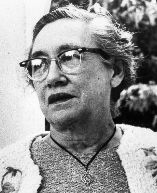
After earning degrees from North Georgia College and George Peabody College for Teachers, Katherine Vickery taught psychology at Alabama College (now the University of Montevallo) from 1922 to 1968. It was during this period, as one of Alabama higher education's most revered teachers, that she touched the lives of students deeply. Many of them have given generously to a University of Montevallo memorial scholarship established in her honor in 1978, appropriately recognizing the outstanding qualities of mind and spirit which distinguished her career.
Dr. Vickery served as president of the Alabama Psychological Association and was a fellow of the Alabama Academy of Science and of the American Association for the Advancement of Science. As national president of Kappa Delta Pi, she was awarded the honor key, laureate - a distinction given to only 50 living members of the national honorary society.
Katherine Vickery, educator and innovator, was more than merely a woman who made a name for herself in her profession nationally. An outspoken advocate of women's rights, she chaired the sub-committee of the Alabama Governor's Commission on the Status of Women and during that time was instrumental in putting together a two-day conference held on the Alabama College campus in 1950. The conference, the first of its kind in Alabama, attracted outstanding speakers and professional women from all over the nation and represented a milestone in the history of the Women's Rights Movement in the state and the Southeast.
Her greatest contribution to the cause of women's rights was her work as a charter member of the American Association of University Women wherein she stood up for her female colleagues by ensuring that positions of leadership were awarded based on the professional qualifications of both male and female candidates equally. Later, she served as president of the Alabama Division (1948-50) and vice president of the Southeast Central Region, gaining thereby a nationwide reputation.
Dr. Vickery also maintained a lifelong commitment to mental health. She played an active role in the Alabama Mental Health Association from its earlier days and saw it grow into an important force in shaping policy. After her retirement, she dedicated herself to researching the mental health field in Alabama. her research culminated in the publishing of her book, A History of Mental Health in Alabama, in 1972. This work is said to have charted a course in the mental health field which placed the state among the leaders in the nation in the development of programs and facilities for the mentally disabled.
Bibliography
Vickery, Katherine. The Effects of Change of Work on the Work Decrement. Nashville: George Peabody College for Teachers, 1931.
![]() Other Inductees
Other Inductees
![]() Alabama Women's Hall of Fame
Alabama Women's Hall of Fame